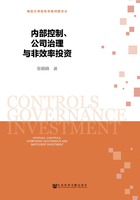
Abstract
Based on the theoretical aspects of the relationship between the relevant internal control and corporate investment efficiency, the paper has proposed new ideas and perspectives. ①Literature on the investment efficiency is clarified from classical economics, new-classical economics and institutional economics and the purpose theory is proposed which emphasizes the consistent objective of the internal control system and the promotion of investment efficiency and aims at deepening internal control. ②Internal control and corporate investment efficiency are closely related. High quality internal control system must take into account the investment efficiency improvement methods, ways, means and measures. Similarly, the efficiency of investment should also be enhanced with the consideration of strengthening the internal control system. ③Inefficient investment level can be used to evaluate the level of the internal control. Internal control actually involves coordinated approach, procedures, policies and measures adopted to improve the operational efficiency and investment efficiency is an important measure of business performance. Therefore, the empirical research of the internal control and the corporate inefficiency investment can serve as evaluating the listed company's internal control construction level.④In the internally controlled state-owned holding companies, internal control is likely to be manipulated by some executives, and becomes“selfserving”behavior, so the company's internal control system will not achieve the role of protecting the interests of investors, and consequently the inefficient investment level ranks relatively higher. As a result, in the context of the new normal downturn of economic growth, it becomes increasingly important to assess and reform the internal control system to protect investors' interests and enhance investors'confidence, which is also essential to“steady growth, structural adjustment”.⑤In this paper, internal control is divided into internal control elements and internal control index, and their respective relationship with investment efficiency are tested with the empirical studies. For different property characteristics, suitable internal control evaluation methods are used which also deepens the empirical theory of internal control.
In conclusion, China's listed company's internal control exerts inhibition effect on the inefficient investment to a certain degree. Of course, the current level of internal control of listed companies in China is still not high, and the listed companies generally lack of understanding of internal controls. Less attention has been paid to the building of the internal control system so that the listed company's internal control system can not fully exert its effect on the company's investment decision-making process. In order to guide enterprises towards scientific and rational investment decisions and avoid investment mistakes, to improve investment efficiency, and to accelerate the internal control system of listed companies, the paper believes the following respects are of great importance.
First, improve the company's control environment, strengthen risk awareness, implement control activities, highlight information communication, and strengthen external supervision. Secondly, in order to improve capital allocation efficiency of China's capital market, internal control especially supervision against managers and major shareholders, should be strengthened to ensure the efficiency of enterprise investment objectives, and reduce inefficient investment.
Finally, the evaluation system of internal control should be constantly improved.
Key Words: Internal Control; Inefficient Investment; Corporate Governance; Over-investment; Under-investment; System Design